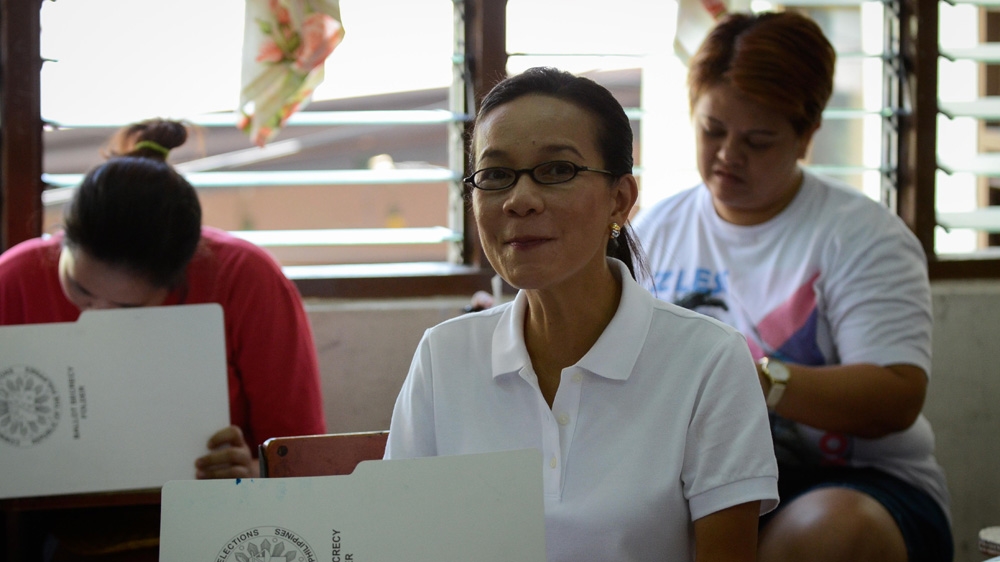Philippines midterm polls to test Rodrigo Duterte's grip on power
More than 61 million people are registered to vote with roughly 43,000 candidates vying for government posts.
Manila, Philippines – A national election of legislators and local executives may help strengthen Rodrigo Duterte’s hold on power halfway through his controversial presidency.
More than 61 million Filipinos are registered to vote in Monday’s midterm polls, with roughly 43,000 candidates vying for some 18,000 government posts.
The election of 12 senators for the 24-seat higher congressional chamber will be decisive. The chamber has so far tempered some of Duterte’s more polarising objectives, such as his attempts at changing the constitution to change the form of government from unitary to federal or reinstating the death penalty.
Senatorial candidates endorsed by Duterte have dominated voter preference surveys by private pollsters, indicating a likely affirmative outcome for his administration.
But critics have expressed fears that a victory for Duterte’s allies would reduce the Senate’s independence and prevent it from keeping a check on the president.
Duterte’s senatorial slate does not come from a single party. Aside from members of his PDP-Laban party, candidates from other parties comprise the “Hugpong ng Pagbabago” or “Collective of Change” fielded by his daughter, Sara Duterte.
Among candidates Duterte has supported are Imee Marcos, Jinggoy Estrada, Ramon Revilla and Juan Ponce Enrile, with the first three seen as probable winners according to opinion polls.
Marcos is the daughter of the late dictator Ferdinand Marcos, who embezzled at least $5bn in government funds when he ruled from 1965 to 1986.
Enrile and Estrada, veterans of the Senate, are facing plunder charges.
Revilla, although acquitted by an anti-graft court of plunder last December, owes the national treasury the equivalent of $2.3m in public funds that went missing under his watch in an earlier Senate term.
Straight eight
No single political party has been able to challenge Duterte’s rule but a “coalition” of eight senatorial candidates from different backgrounds are running as an opposition bloc.
Although the “Otso Diretso” or “Eight Straight” opposition bloc appears unlikely to win many Senate seats, “they were able to shape the campaign in terms of the issues at stake,” said Nicole Curato, senior research fellow at the Centre for Deliberative Democracy and Global Governance at the University of Canberra.
In their campaign, the opposition bloc criticised Duterte’s foreign and economic policies as being too favourable towards China. They denounced the impunity for thousands of killings in his “war on drugs”, and his endorsement of politicians tainted with grave allegations of corruption.
“The Otso Diretso were able to make a sustained critique about China’s relationship to the Philippines, as well as insist on the importance of liberal values like human rights and gender equality,” Curato, who is also the editor of A Duterte Reader: Critical Essays on Rodrigo Duterte’s Early Presidency, told Al Jazeera.
Owning their underdog status in the race, the Otso Diretso accused the pro-administration bloc of using public resources to fuel their campaign, calling them “dishonest”.
Sara Duterte, who spoke for the pro-administration bloc, retorted that “honesty should not be an issue” in the elections. Her statement backfired, drawing the media spotlight on the candidates’ integrity and track record.
As the opposition bloc put more pressure on the pro-administration bloc, the Office of the President hit back by accusing the Otso Diretso of trying to overthrow Duterte, a claim that did not seem to gain credence among the public.
But will it all translate into votes for the opposition?
“The narratives and issues the Otso raised seems to have failed to capture the public’s imagination,” said Dindo Manhit, president of the Albert del Rosario Institute for Strategic and International Studies, a policy think-tank based in the capital, Manila.
“We must accept that elections are about what people care about, and right now it is still Duterte and his candidates who are saying the right things,” Manhit told Al Jazeera.
Last week, a new survey showed that 81 percent of Filipinos expressed satisfaction with Duterte’s administration, citing its efforts to help the poor and improve security, among other reasons.
Curato said Duterte’s enduring popularity shows that “people are willing to overlook some democratic values for the sake of Duterte’s promise of change.”
Besides, midterm elections in the Philippines tend to affirm the status quo, especially when the president is popular, both analysts noted.
Politics in the Philippines is strongly oriented towards personalities, which explains the general success of familiar names and faces even despite less-than-ideal track records.
Duterte himself had ruled the major southern city of Davao for nearly three decades before becoming president in 2016.
Among those likely to win another term as senators are Grace Poe, Nancy Binay and Lito Lapid – candidates popular enough not to need Duterte’s endorsement, and are running neither under the administration nor the opposition.
Poe is the daughter of two of the Philippines’ biggest movie stars. Binay’s father is a former vice president. Lapid used to star in action films.
‘Not necessarily puppets’
Although Duterte can expect to gain more allies in the Senate after Monday’s vote, Manhit said they will “not necessarily act as his puppets”.
“With those three strong candidates setting themselves apart from Duterte, there’s reason to think the Senate can continue to be independent,” he added.
As for the candidates supported by Duterte, “they are not a homogeneous bloc,” said Curato. “They have different interests, appeal to different constituencies and form different alliances.”
Still, the new Senate will probably be generally supportive of Duterte, both analysts said. What will be crucial are their positions on Duterte’s dealings with China, and his proposal to shift to a federal form of government that may give him a chance to stay in power beyond the end of his legally mandated single term in 2022.
“There is no precedent to think that the Senate will simply follow Duterte’s wishes,” Curato said, “though vigilance is always good.”
Source: Read Full Article




